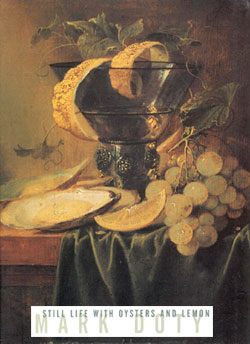I read poet Mark Doty's prose book,
Still Life with Oysters and Lemon recently.
Luminous! Delectable! It is a book simultaneously full of the poignancy and joy of life! Even if you did not know who Doty is, reading it, you can tell this was written by a man with a vision of a poet! I ought to just buy this book and relive the experience from time to time through the remainder of my life!
I found myself wanting to mark or transcribe almost every line of the book. Paragraph after paragraph were worthy of being excerpted and blogged about. But then I realized, that like many poems, it could only be enjoyed in its whole. One cannot quote a paragraph out-of-context and try to convey the joyous experience of reading the book.
Despite this, I'll just leave you with an extended excerpt from the last page of the book... which tell you more about "Still Life" painting, poetry, and life itself than anything else you will have read recently.
Still life. The deep pun hidden within the term: life with death in it, life after the knowledge of death, is, after all, still life.
The darkness behind these gathered things - a living darkness, almost breathing, almost a pressure against us -- is the not-here, the not-now; what we can see are the illuminated things right before us, our good company. The space looming behind them is the unknown of everything else - is, in other words, a visible form of death, and therefore what stands before that darkness stands close together.
What makes a poem a poem, finally, is that it is unparaphrasable. There is no other way to say exactly this; it exists only in its own body of language, only in these words. I may try to explain it or represent it in other terms, but then some element of its life will always be missing.
It's the same with painting. All I can say of still life must finally fall short; I may inventory, weight, suggest, but I cannot circumscribe; some element of mystery will always be left out. What is missing is, precisely, its poetry.
Part of what that poetry is, I think, the inner life of the dead, held in suspension. It is still visible to us; you can look at the paintings and you can feel it. This is evidence that a long act of seeing might translate into something permanent, both of ourselves and curiously impersonal, sturdy, useful.
Ok...let me transcribe one more excerpt... randomly open the book and lo - there is something worth sharing!
Sometimes I think these paintings seem full of secrets, full of unvoiced presences. And surely one of their secrets - somewhere close to their essence - lies in a sense of space that is unique to them. These things exist up close, against a background of burnished darkness. No wide vistas open behind them, no far-flung landscapes, no airy vastness of heaven. This is the space of the body, the space of our arms' rach. There is nothing before us here we could not touch, were these things not made of paint. The essential quality of them is their nearness. ........ these paintings reside in domestic, physical, fleshy space. ......... everything in this up-close, bodily space is delineated with such clarity. We're accustomed to not seeing what is so near to us; we do not need to look at things that are at hand, because they are at hand every day. ...... Novelty recedes, in the face of the daily, and we're free to relax, to drift, to focus inward. But in still life the familiar is limned with an almost hallucinatory clarity, nothing glanced over or elided, nothing subordinate to the impression of the whole.
....
All those painters, all their lives looking at reality with such scrupulous attention, attention pouring out and out, and what does it give us back but ourselves? What is documented, at last, is not the thing itself but the way of seeing - the object infused with the subject. The eye moving over the world like a lover. And so the boundary between self and world is lelided, a bit, softened.
Go read the book in its entirety -- it is full of such gems! Even if you are a better appreciator of still life paintings than I am and have appreciated still life before, you will find a rare and unique joy in the book - a celebration of life, death, and the nostalgia of memory that is captured in "things". Experiencing a poet's words is, like experiencing a painting, a unique and redeeming experience! ;)






